Airbnb vs. Long-Term Rentals: Which Makes the Most Profit? An Analysis of the 50 Largest U.S. Markets
Rental property owners face tough decisions when deciding how to maximize income from their unit. Part of this includes their rental strategy: should they list their property as a vacation rental (like Airbnb or Vrbo) or as a long-term rental with a standard 12-month lease?
This decision can mean the difference of thousands of dollars in net rental income each year. And to make matters more confusing, returns can vary wildly depending on the city and room type of each property.
To help shed some light on this issue, we at RentHop have partnered with AirDNA, the leader in vacation rental analytics. We compared AirDNA’s vacation rental data with our own long-term rental data in the 50 largest US cities.
The results below describe our analysis and provide specific insight into how rental property owners can maximize their profits based on the city and room type of their property.
Key points to remember
- Smaller units are better suited for long-term rentals in most cities. However, as the number of bedrooms increases, units become more lucrative to list as vacation rentals. By the time a property grows to four bedrooms, listing it as a vacation rental is more profitable in 90% of cities.
- In cities with high tourist demand, vacation rentals are more profitable than long-term rentals with fewer bedrooms.
- Unsurprisingly, long-term rentals are more favorable in cities where long-term rental prices are higher, regardless of the number of bedrooms. This happens in cities such as NYC, Miami, Los Angeles, and Oakland.
One bedroom rentals
If you own a one-bedroom rental property, you’ll probably want to list it as a traditional lease. In reality, one-bedroom units were more profitable as long-term rentals in 96% of citiescompared to vacation rentals.
Cities with the highest long-term return for a one-bedroom rental
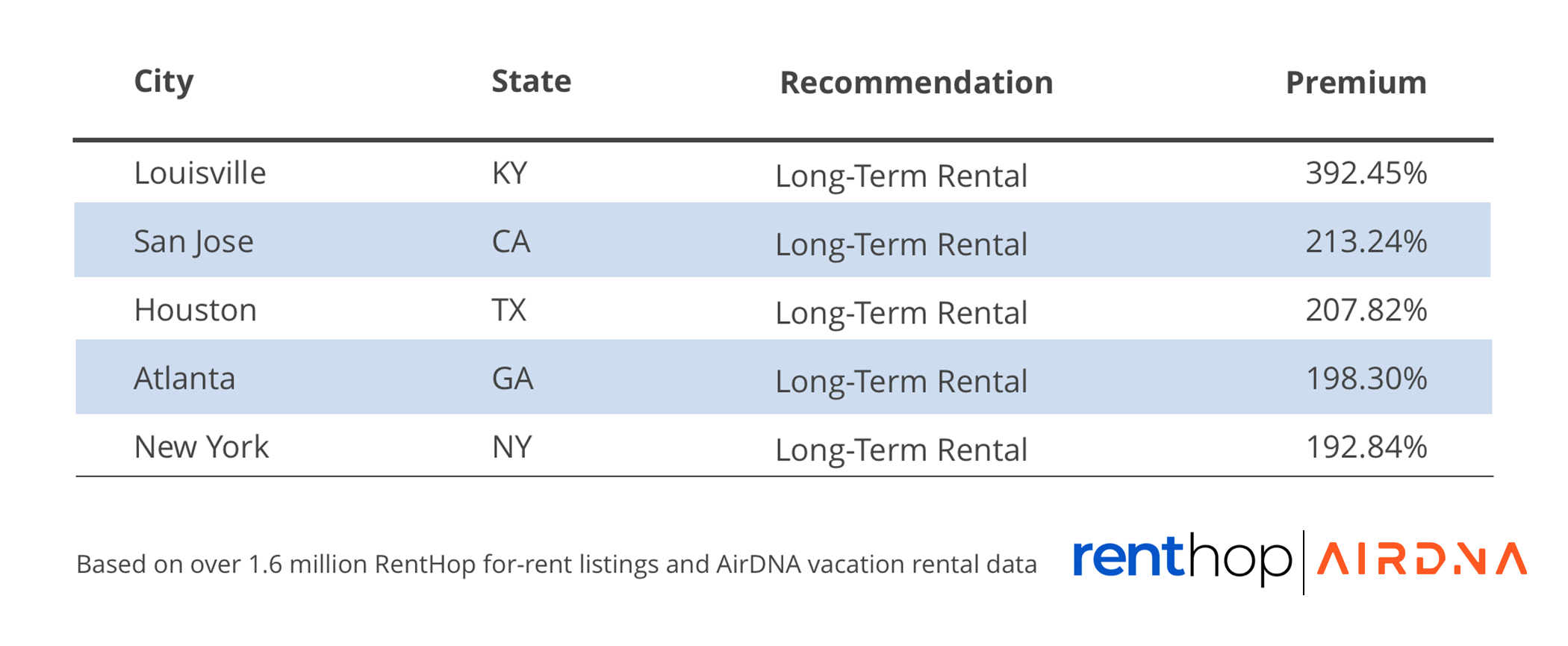
Louisville, San Jose, and Houston saw the highest return on investment for long-term one-bedroom unit rentals. In Louisville, a landlord can earn 392% more each year by renting out their property as a long-term rental rather than a vacation property.
Cities with the highest vacation return for a one-bedroom rental

Only two cities, Nashville and Virginia Beach, have seen one-bedroom vacation rentals outpace traditional leases. Given Nashville’s vibrant tourism industry, it makes sense that a bed could generate 44.94% more revenue as a vacation rental.
A similar case applies to Virginia Beach, where homeowners earn an average net income of $766.23 per month, or $9,194.76 per year, from those looking to take beach vacations.
Two bedroom rentals
Two-bedroom units were more profitable to list as a long-term lease in 64% of citiescompared to vacation rentals.
Cities with the highest long-term return for a two-bedroom rental
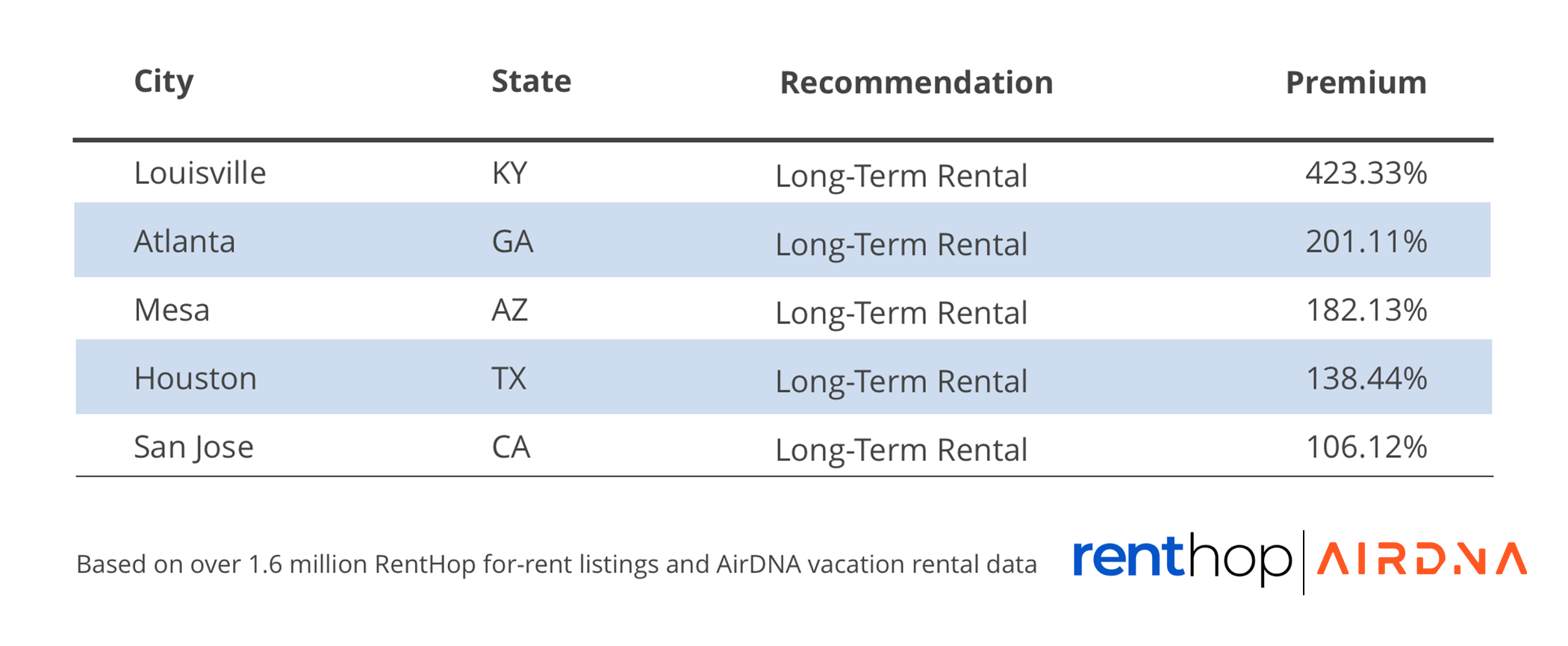
Louisville, Atlanta, and Mesa see the biggest difference in profits when renting long-term units versus vacation rentals. San Jose, though fifth in overall returns, had the highest net rental income among those top five cities, where landlords earn an average of $9,591.48 a year.
Cities with the highest vacation return for a two-bedroom rental
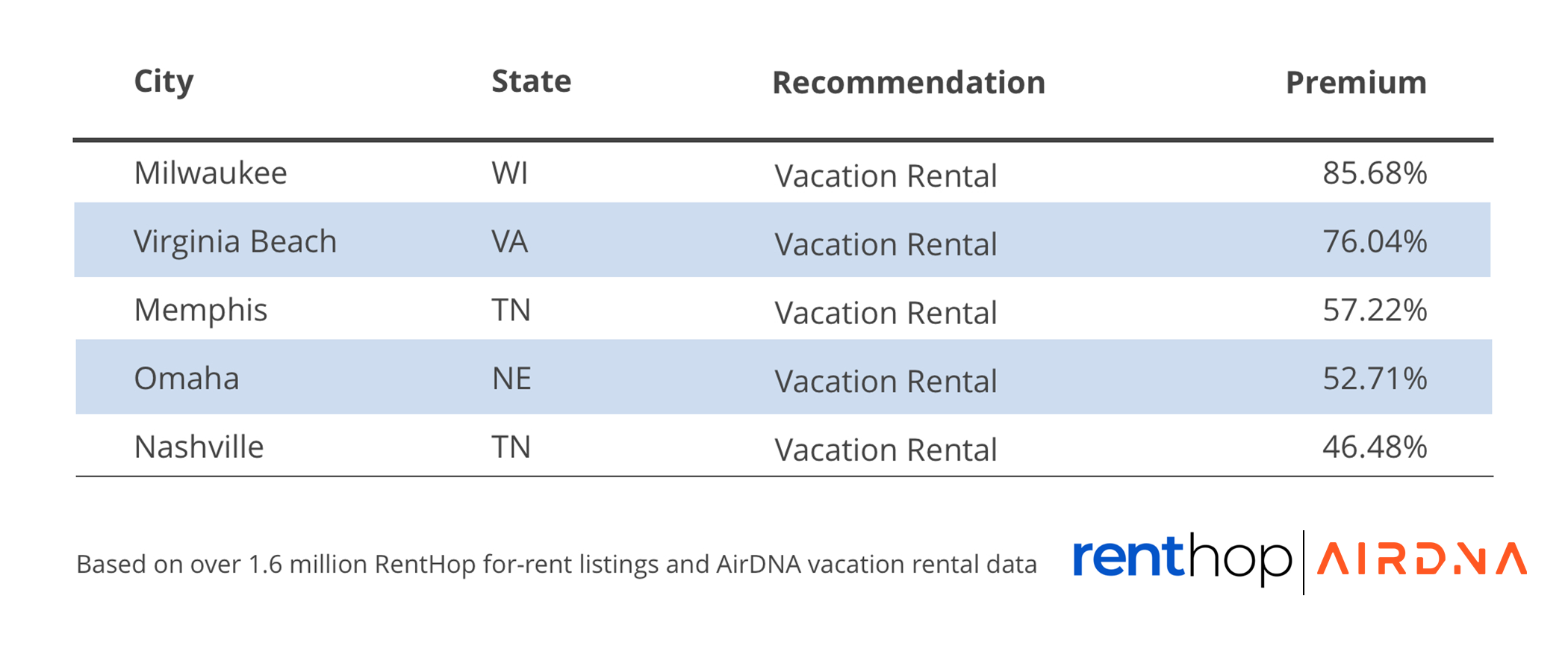
Vacation rentals were more lucrative in only 18 of the 50 cities on our list, led by Milwaukee, Virginia Beach and Memphis. Milwaukee landlords charge an average of $141.62 per night on Airbnb for their two beds, resulting in an annual net rental income of $10,862.16.
Three bedroom rentals
Vacation rentals outperformed long-term leases in 64% of cities for a three bedroom apartment.
One explanation for this shift from long-term to vacationing at this level is the increased demand and rate per night for larger properties on Airbnb. For larger groups, many vacationers are forgoing traditional hotels and looking for larger three-bedroom properties on Airbnb and Vrbo. Larger properties also typically have amenities such as a pool, hot tub, or courtyard that can increase the average nightly rate.
Cities with the highest long-term return for a three-bedroom rental
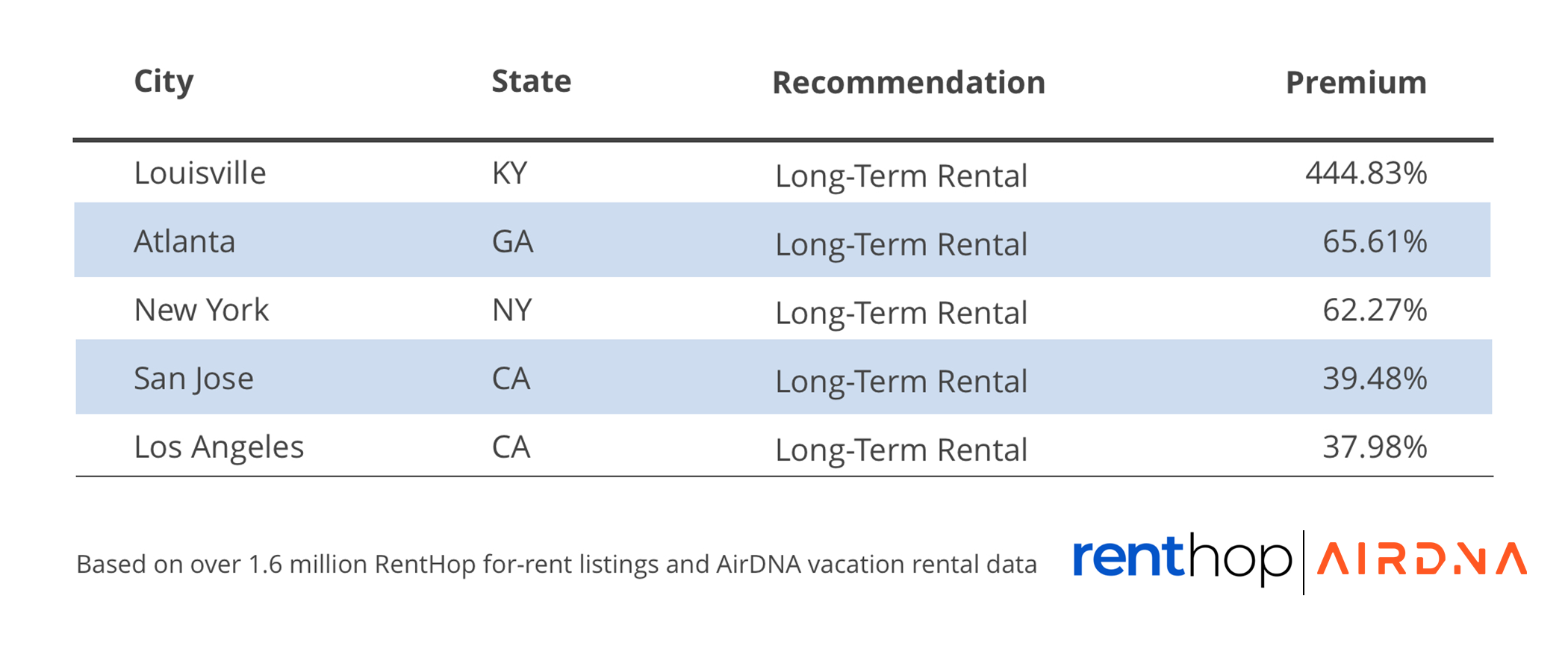
Long-term rentals were more lucrative in just 16 of the 50 cities on our list, led by Louisville, Atlanta and New York.
In cities with unaffordable housing markets like New York and Los Angeles, it makes sense that owners of long-term rentals continue to report high rental value on three beds, as many residents have to rent when they can’t afford the cost of buying of a house.
Cities with the highest vacation return for a three-bedroom rental
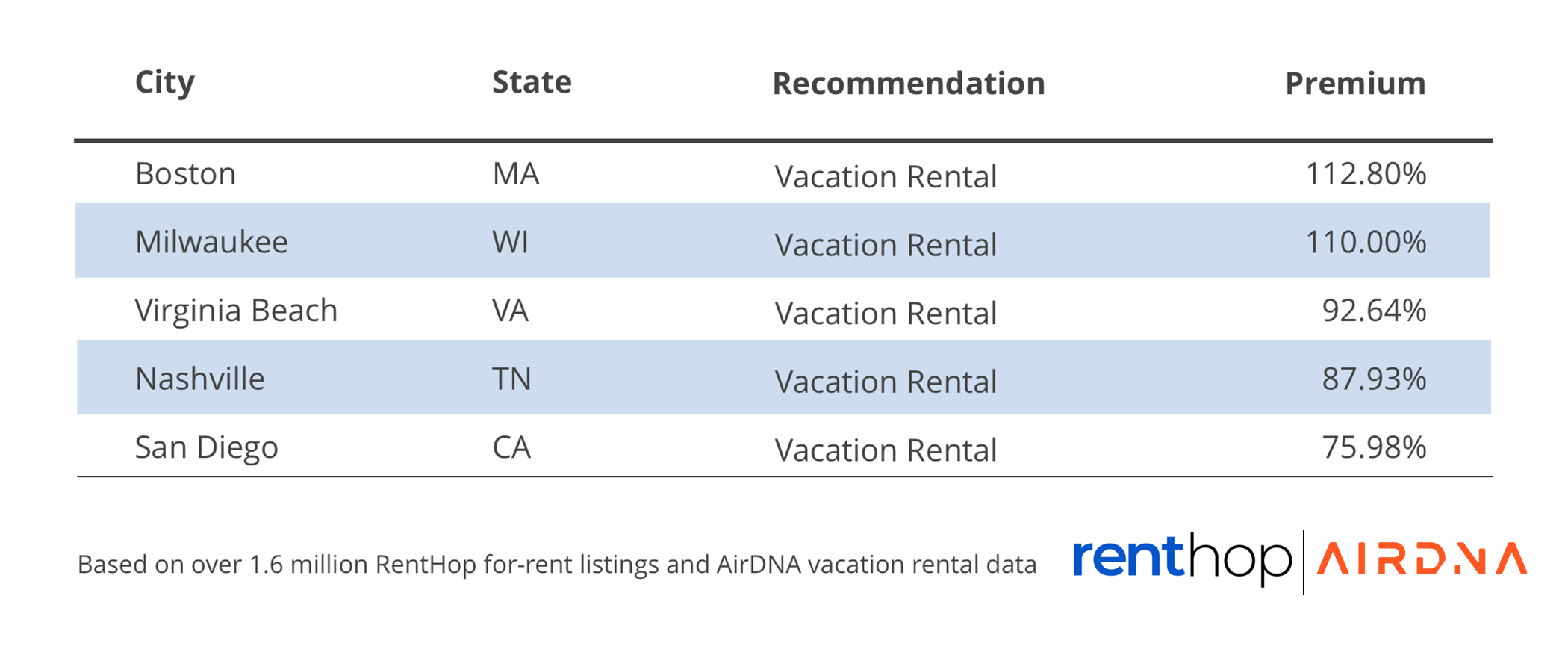
For Boston, Milwaukee, and Virginia Beach, landlords can generate significantly higher revenue by listing their three-bedroom as a vacation rental rather than a long-term rental. In Boston, homeowners like this earn 112.80% more by listing on Airbnb, due to an average daily rate of $550.14 and an impressive monthly income of $3,724.03.
Four bedroom rentals
Do you have a four bedroom property? You should probably list it on Airbnb. Vacation rentals outperformed long-term leases in 90% of cities for this room size.
Cities with the highest long-term return for a four-bedroom rental
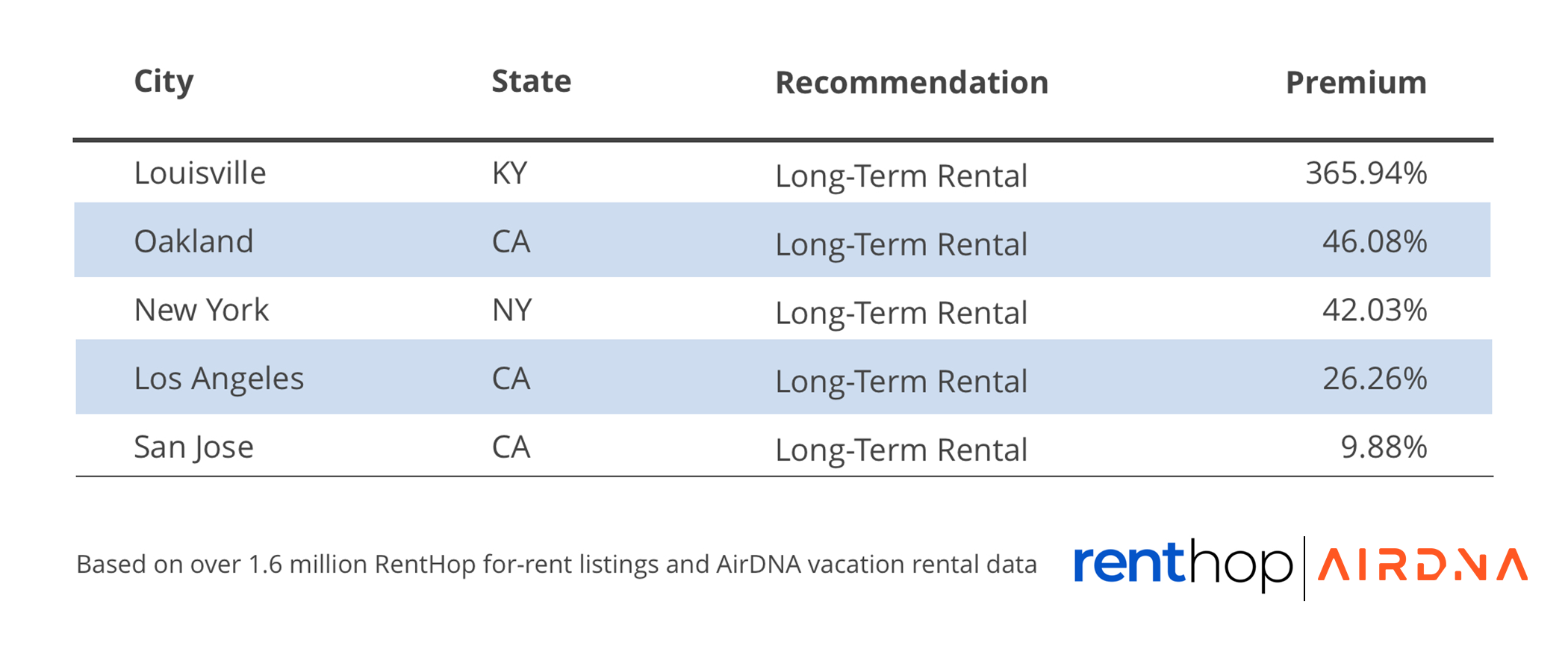
There are only a handful of cities where landlords can generate higher profits by listing their four beds for long-term rentals, led by Louisville and Oakland.
Cities with the highest vacation return for a four-bedroom rental
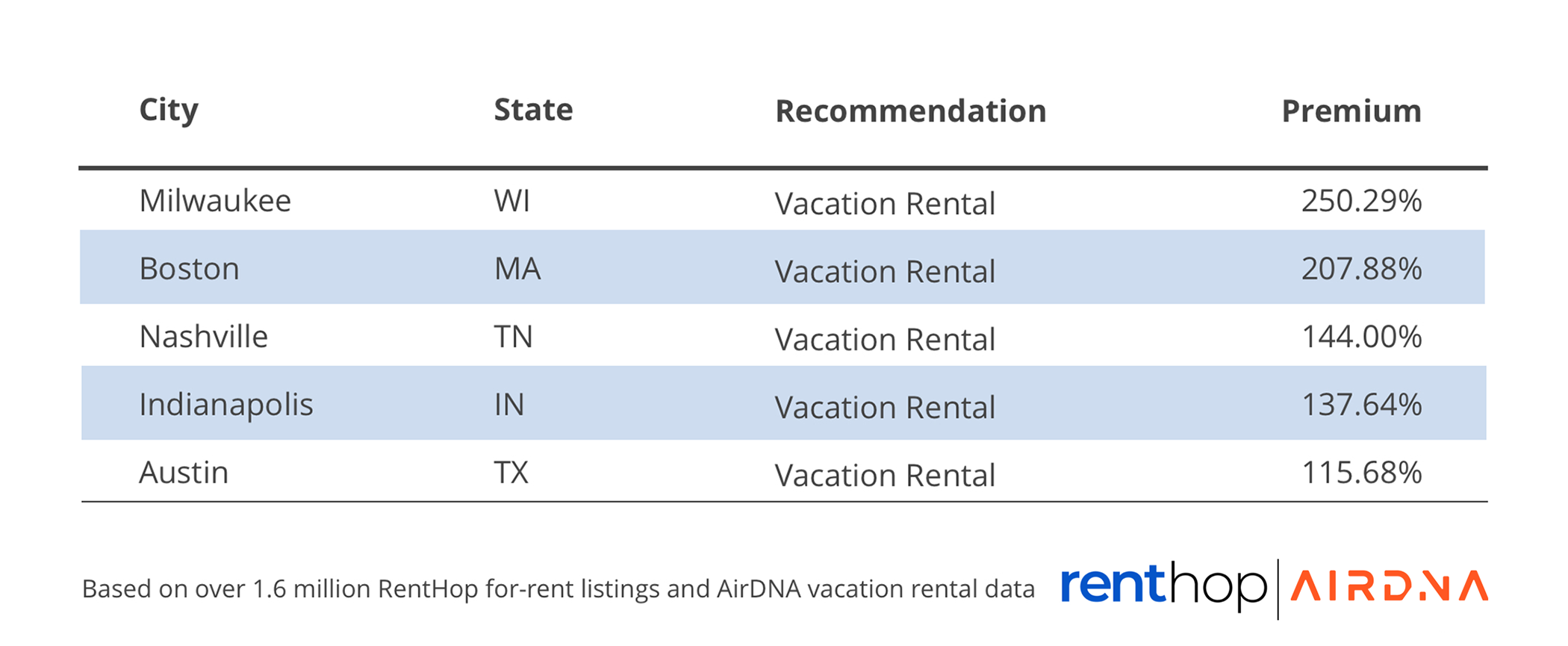
Milwaukee, Boston, and Nashville see the highest variances when listing a four-bedroom apartment as a vacation rental instead of a long-term lease.
Other Notable Findings
- Nashville: Vacation rentals are more lucrative for each room type in Nashville. The town remains a popular tourist destination, particularly for bachelor and bachelorette parties. Owners listed on Airbnb can expect more than 5 stays per month, with an average of nearly 3 nights per stay.
- Virginia Beach: Similar to Nashville, owners in Virginia Beach get more out of each room type when listed as a vacation rental.
- Boston: Three- and four-bedroom units in Boston are among the top 10 most profitable property types compared to long-term rentals. Airbnb’s nightly rates in Boston increased by 42% between July 2019 and August 2022, largely due to higher rates in the luxury tier which drove up the overall averages. Owners have leveraged these higher daily rates to their advantage.
- Louisville: Long-term rentals significantly outperform Louisville vacation rentals, regardless of room size. The city, unfortunately, does not have a strong enough hotel industry to drive vacation demand, making traditional leases much more lucrative.
Vacation Rental and Long-Term Rental Profits by Number of Bedrooms and City
Limits
This study interprets vacation rental data to determine whether it is more lucrative for a landlord to rent out their home on a vacation or long-term basis. This study assumes operating expenses of 50% in all cities. However, vacation rentals may have additional operating expenses compared to long-term rentals, as landlords typically cover utilities such as internet and electricity.
While this study makes a distinction based on the number of bedrooms, it does not distinguish between property size and type. Different terrains, features and other amenities can also impact this data. This idea is especially true with three- and four-bedroom properties, as they typically have amenities such as pools, yards, finished basements, and views, which increase the amount a homeowner can charge.
Methodology
This study focused on how rental property owners in the 50 largest US cities can maximize rental profits. To calculate the median long-term rental by number of bedrooms, we analyzed over 1.6 million rental listings created on RentHop between March 1, 2022 and August 31, 2022. We then calculate the monthly net operating profit by number of rooms based on 50% running costs. For the purposes of this study, we have only included one-bedroom, two-bedroom, three-bedroom and four-bedroom properties.
Vacation rentals monthly net operating income was calculated using data provided by AirDNAincluding average daily rates, total nights booked and available listings between March 2022 and August 2022. We have assumed 50% of owners’ operating expenses to run a vacation rental. In addition, to fairly compare the benefits of seasonal rental and long-term rental, Whole unit vacation rental reservations only were included in the dataset.
For more information on our methodology or to contact our data team, please email [email protected].




